Related Research Articles
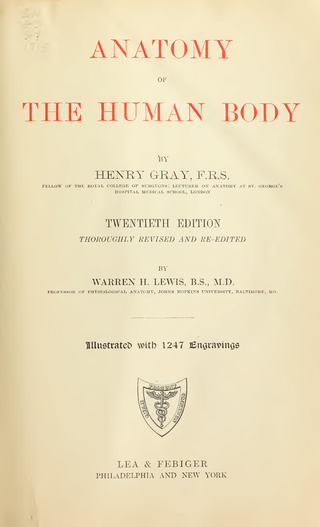
Gray's Anatomy is a reference book of human anatomy written by Henry Gray, illustrated by Henry Vandyke Carter, and first published in London in 1858. It has gone through multiple revised editions and the current edition, the 42nd, remains a standard reference, often considered "the doctors' bible".

In music, unison is two or more musical parts that sound either the same pitch or pitches separated by intervals of one or more octaves, usually at the same time. Rhythmic unison is another term for homorhythm.
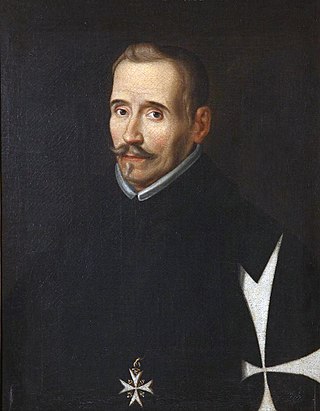
Félix Lope de Vega y Carpio was a Spanish playwright, poet, and novelist. He was one of the key figures in the Spanish Golden Age of Baroque literature. His reputation in the world of Spanish literature is second only to that of Miguel de Cervantes, while the sheer volume of his literary output is unequalled, making him one of the most prolific authors in the history of literature. He was nicknamed "The Phoenix of Wits" and "Monster of Nature" by Cervantes because of his prolific nature.

The ABRSM is an examination board and registered charity based in the United Kingdom. ABRSM is one of five examination boards accredited by Ofqual to award graded exams and diploma qualifications in music within the UK's National Qualifications Framework. 'The Associated Board of the Royal Schools of Music' was established in 1889 and rebranded as ABRSM in 2009. The clarifying strapline "the exam board of the Royal Schools of Music" was introduced in 2012.

Cordel literature (from the Portuguese term, literatura de cordel, literally “string literature”, Portuguese pronunciation:[koʁˈdɛw]) are popular and inexpensively printed booklets or pamphlets containing folk novels, poems and songs. They are produced and sold in street markets and by street vendors in Brazil, mainly in the Northeast. They are so named because they are hung from strings to display them to potential customers, and the word for rope in Portuguese is corda, from which the term cordel is derived.
In music, especially Western popular music, a bridge is a contrasting section that prepares for the return of the original material section. In a piece in which the original material or melody is referred to as the "A" section, the bridge may be the third eight-bar phrase in a thirty-two-bar form, or may be used more loosely in verse-chorus form, or, in a compound AABA form, used as a contrast to a full AABA section.
Juan Bautista Diamante, minor Spanish dramatist of the school of Calderón, was the son of a Portuguese mother and a Sicilian merchant of Greek parentage who came to Madrid some time before 1631. He began writing for the stage in the early 1650s, gained favour at the courts of Philip IV and Charles II, and became a knight of St. John in 1660. It has been suggested that Juan Bautista may have been of Jewish stock, and that the Diamante family, including the playwright's half-brothers Pablo and Francisco Diamante who also achieved success in their different spheres, falsified public records of marriage, baptism, etc. in order to obscure their marrano origins.
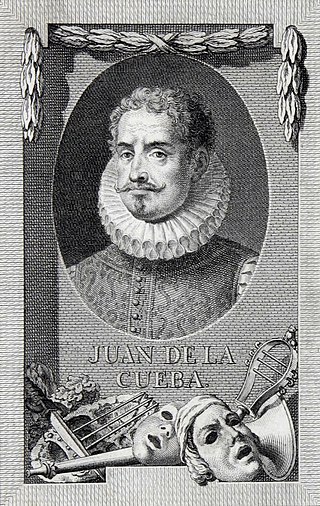
Juan de la Cueva de Garoza (1543–1612) was a Spanish dramatist and poet. He was born in Seville to an aristocratic family; his younger brother Claudio, with whom he spent some time in Guadalajara, Mexico, went on to become an archdeacon and inquisitor. He was acquainted with a number of major contemporary intellectual figures, including Fernando de Herrera and Juan de Mal Lara, and took part in the Casa de Pilatos literary academy in Seville. After his return to Spain in 1577, he began writing for the stage and produced a total of ten comedies and four tragedies. He appears never to have married, though some of his poetical works are dedicated to a Felipa de la Paz. After apparently spending some time in Cuenca after 1610, he died in Granada in 1612.

Luís Fernando Verissimo is a Brazilian writer. Verissimo is the son of Brazilian writer Erico Verissimo and lived with his father in the United States during his childhood. Best known for his crônicas and texts of humor, more precisely satire of manners, published daily in several Brazilian newspapers, Verissimo is also a cartoonist, translator, and television writer, playwright and novelist. He has also been advertising and newspaper copy desk. He is also a musician, having played saxophone in a few sets. With over 60 published titles, is one of the most popular contemporary Brazilian writers.
Coraima Alejandra Torres Díaz is a telenovela actress. She started her acting career in Venezuela, in the late 1980s. Her first roles were in the telenovelas "Gardenia" and "Alondra". She got her first leading role in 1992, in the famous telenovela "Kassandra", which was shown in more than 100 countries. After "Kassandra" she went to Colombia where she got a leading role in the telenovelas "Sueños y espejos". Her partner in that telenovela was Colombian actor Nicolas Montero. They fell in love and got married in 1996. Coraima gave birth to a son in 1994.

Theater was introduced in Colombia during the Spanish colonization in 1550 through zarzuela companies. Colombian theater is supported by the Ministry of Culture and a number of private and state-owned organizations. Among the most important organizations are the National Association of Scenic Directors (ANDE), Performing Arts Workers Associations, Antioquia Storytellers Association, Colombian Association of Critique and Theater Research (ACIT), Puppeteers Associations (ATICO), and the Colombian Corporation of Theater, among others.
A loa is a short theatrical piece, a prologue, written to introduce plays of the Spanish Golden Age or Siglo de Oro during the 16th and 17th centuries. These plays included comedias and autos sacramentales. The main purposes for the loa included initially capturing the interest of the audience, pleading for their attention throughout the play, and setting the mood for the rest of the performance. This Spanish prologue is specifically characterized by praise and laudatory language for various people and places, often the royal court for example, to introduce the full-length play. The loa was also popular with Latin American or "New World" playwrights during the 17th and 18th centuries through Spanish colonization.

Alexis Valdés is a Cuban actor, comedian, monologist, film producer, playwright, poet, singer and screenwriter. He was born in Havana, Cuba, on August 16, 1963.

Eva María Hernández Villegas, better known as Eva Hache, is a Spanish comedian, actress and television show hostess. Among other performances, she is known for her late night show Noche hache, and for hosting two successive Goya Awards ceremonies.
Lorenzo de Sepúlveda was a Spanish writer best known as the author of romances in verse.

Quarto is the format of a book or pamphlet produced from full sheets printed with eight pages of text, four to a side, then folded twice to produce four leaves. The leaves are then trimmed along the folds to produce eight book pages. Each printed page presents as one-fourth size of the full sheet.
Suelta may refer to:
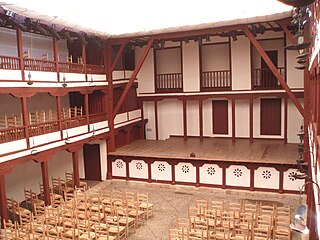
Corral de comedias is a type of open-air theatre specific to Spain. In Spanish all secular plays were called comedias, which embraced three genres: tragedy, drama, and comedy itself. During the Spanish Golden Age, corrals became popular sites for theatrical presentations in the early 16th century when the theatre took on a special importance in the country. The performance was held in the afternoon and lasted two to three hours, there being no intermission, and few breaks. The entertainment was continuous, including complete shows with parts sung and danced. All spectators were placed according to their sex and social status.
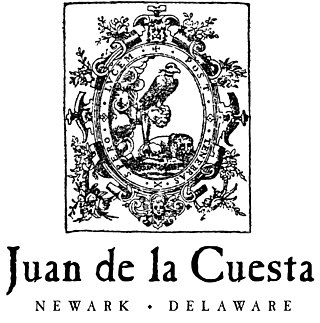
Juan de la Cuesta Hispanic Monographs (Cuesta) is a North American publishing house located in Newark, Delaware. Established in 1978 by Tom Lathrop, Cuesta has published over 400 books dealing with Spanish linguistics and Spanish and Latin American literature from medieval to modern times with a focus on the Spanish Golden Age.
References
- ↑ Some Problems Posed by Suelta Editions of Plays, Don W. CruickShank
- ↑ "The Comedia Suelta: History of a Format", Edward M. Wilson
- ↑ Margarita Vazques Estevez, "Comedias sueltas del 'Institut de Teatre' en Barcelona", Edition Reichenberger, 1987, ISBN 3-923593-46-5, 220pp., p. 7, Introduction